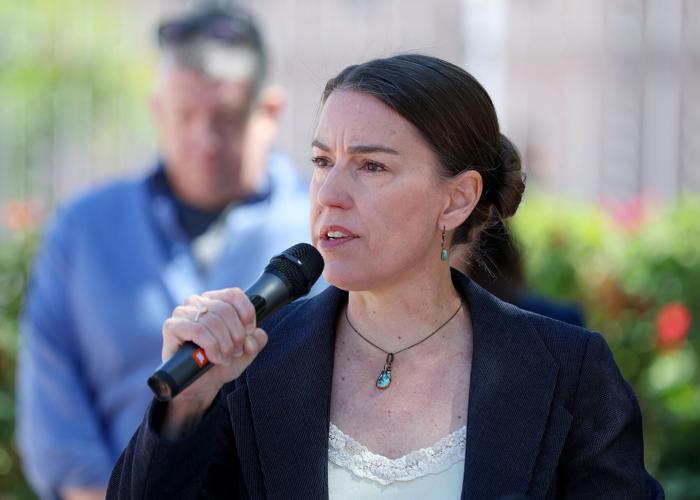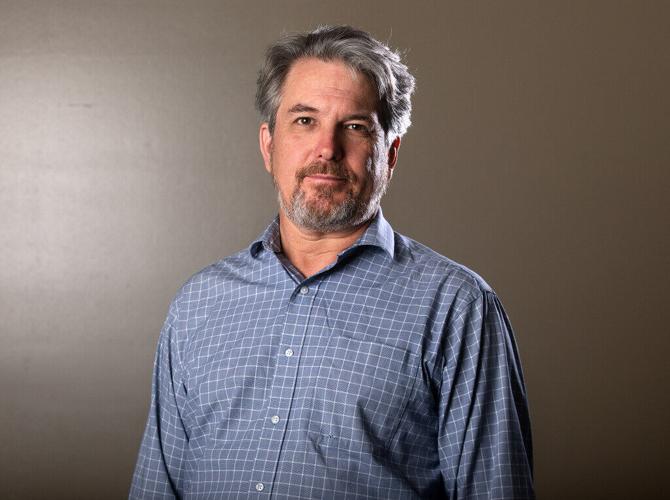The phone rang when Pima County Attorney Laura Conover was at home in Tucson washing dishes, and the caller was at a Phoenix-area restaurant.
It was Nick Acedo, an attorney on contract for Pima County, returning Conover’s call about her plan to vacate the criminal case against Louis Taylor, the man convicted of setting the deadly 1970 Pioneer Hotel fire.
Acedo didn’t like the plan and, according to Conover, lost his temper.
The call happened two years ago, on May 27, 2022, but it still resonates powerfully today. It could help determine whether Taylor wins significant damages against Pima County and the city of Tucson in a trial scheduled for July 8.
In this election year, with Conover facing a Democratic primary challenge, it also helps shed light on how she has handled one of the trickiest issues of her first term as county attorney — the criminal and civil cases involving Louis Taylor.
By her own description during the 2020 campaign, Taylor’s questionable 1972 conviction for the Pioneer Hotel fire helped inspire her career. She said in Facebook comments that year that Taylor “should have been compensated in my humble opinion.”
When she took office, Conover had a chance to do something about it. In the end, she didn’t take that chance, and that’s what makes that May 2022 call so important.
Was she influenced by an implied threat Acedo allegedly made to report her to the State Bar if she vacated the charges? Was she influenced by Pima County’s desire to minimize any settlement or damages paid to Taylor?
If so, that could help Taylor’s legal team overcome one of their big legal obstacles, the fact that the convictions against Taylor remain standing.
“The idea that Nick or his behavior or tone or anything along those lines had anything to do with the decision is totally false,” Conover told me Thursday.
All that came out of the conversation she said, was her agreement to look at a few filings that Acedo recommended.
But that’s not how some of Conover’s allies saw it, and the timeline is suspicious.
The new integrity unit
When Conover took office, she put Gabriel ‘Jack’ Chin in charge of a passion of both of theirs: He headed the new Conviction and Sentencing Integrity Unit. This was a unit that would look back at Pima County cases with questionable outcomes.
In early 2021, Chin started reviewing Louis Taylor’s conviction.
You’d be forgiven if you thought all this was resolved in 2013. That’s when then-Pima County Attorney Barbara LaWall’s team came to a new plea agreement with Taylor, who was 16 when the fire happened. Taylor agreed to plead no contest to 28 counts of murder, and he was released from prison after 42 years.
But it didn’t end there. In 2015, Taylor, represented by a high-powered legal team, filed suit against Pima County and the city of Tucson. He alleges that racism and poor training in the Tucson Police Department and Pima County Attorney’s Office led to a wrongful conviction and decades of Taylor’s life lost in prison.
There is, indeed, a question about whether the Pioneer Hotel fire resulted from arson at all.
After more than a year reviewing the case, Chin recommended to Conover that she ask a judge to vacate Taylor’s convictions. By most accounts, that’s what she decided to do.
On that Friday before Memorial Day in 2022, she called key parties, including victims and their representatives, to tell them she planned to move to vacate Taylor’s convictions the next week. She even wrote a press release.
On Thursday, Conover told me she was telling these people that she was “likely” going to move to vacate the charges.
But I don’t understand why you would call these parties unless you had made a firm decision. And the language of the press release — granted, an unpublished draft — sounds a lot more certain than that:
“Last week, I concluded that the Pima County Attorney’s Office could no longer support the criminal conviction against Louis Taylor in the Pioneer Hotel fire of 1970.”
An ethical bind
In a strange turn of events, Acedo ended up questioning Conover under oath during a September 2023 deposition about the conversation the two of them had on May 27, 2022.
“Did I tell you that I was going to file a bar complaint?” Acedo asked.
“No,” Conover answered.
“Did I tell you that I was going to contact the State Bar?” he continued.
“No,” she said.
“So, what is it that you recall me saying about the State Bar?”
“That the State Bar would have a firm opinion about this.”
The possible ethical issue at play was that, as Pima County attorney, by vacating Taylor’s criminal conviction, she would be putting Pima County in jeopardy. But on the other side, Conover was ethically required to do justice for any wrongfully convicted defendant, whatever the impact on the county.
It was a bind. But two of Conover’s allies said Acedo had a decisive effect on her thinking. In a deposition in September 2023, Chin said that conversation is what caused Conover to “pause” her decision to vacate the convictions.
He added, “I believe it was clear that Mr. Acedo or someone else from his firm had taken the position that the county attorney’s office as counsel for the county, had duties to the county.”
Nina Trasoff, the former newscaster and Tucson City Council member, got involved in the issue because Conover, a friend, asked her to review the draft press release. In an affidavit obtained by Taylor’s attorneys, Trasoff attributed Conover’s change of mind to a threat.
Conover, she swore, “told me she had not gone forward with the original press release, which had been scheduled for May 28 (2022), because Phoenix lawyers had threatened bar discipline and possible disbarment if she went forward with the plan to exonerate Mr. Taylor.”
Deciding not to act
Conover, of course, says that’s not it at all. On Thursday, she told me that after the May 2022 call, she agreed to go back and look at some filings that Acedo asked her to read. That weekend, her team talked it over.
Weeks passed, and she decided not to pursue vacating Taylor’s conviction. A new press release was drawn up. This one actually was released, on Aug. 3, 2023.
“At the end of the day I felt like there was no way we could carry our burden, but getting to that decision was rough,” Conover said Thursday. “There was robust internal debate for sure.”
"I eventually sided with the legal experts that say Arizona law is deeply restrictive on relief later in time," she continues. "Unless I can point to something since the no-contest plea of 2013 that proved actual innocence, there was nothing I could do on the criminal side."
The call continues to resonate this month. In the first week of May, Acedo filed two sworn declarations, under seal, both of which apparently discuss the May 2022 conversation with Conover.
Taylor’s team referred to them in a subsequent filing, not sealed, saying that in the second affidavit, Acedo takes back much of what he said about the call in the first affidavit. Taylor’s team wrote that Acedo implies in his declarations that “Conover committed perjury at her deposition.”
Acedo denies that his declarations say or imply that at all.
What strikes me, in retrospect, is that in 2022, Conover made a risk-averse legal decision not to vacate Taylor’s convictions. Coincidence or not, her decision protected her from a likely Bar complaint and getting crosswise with Pima County’s financial interests.
It’s probably not the decision that 2020 Laura Conover, the first-time candidate, would have made.





